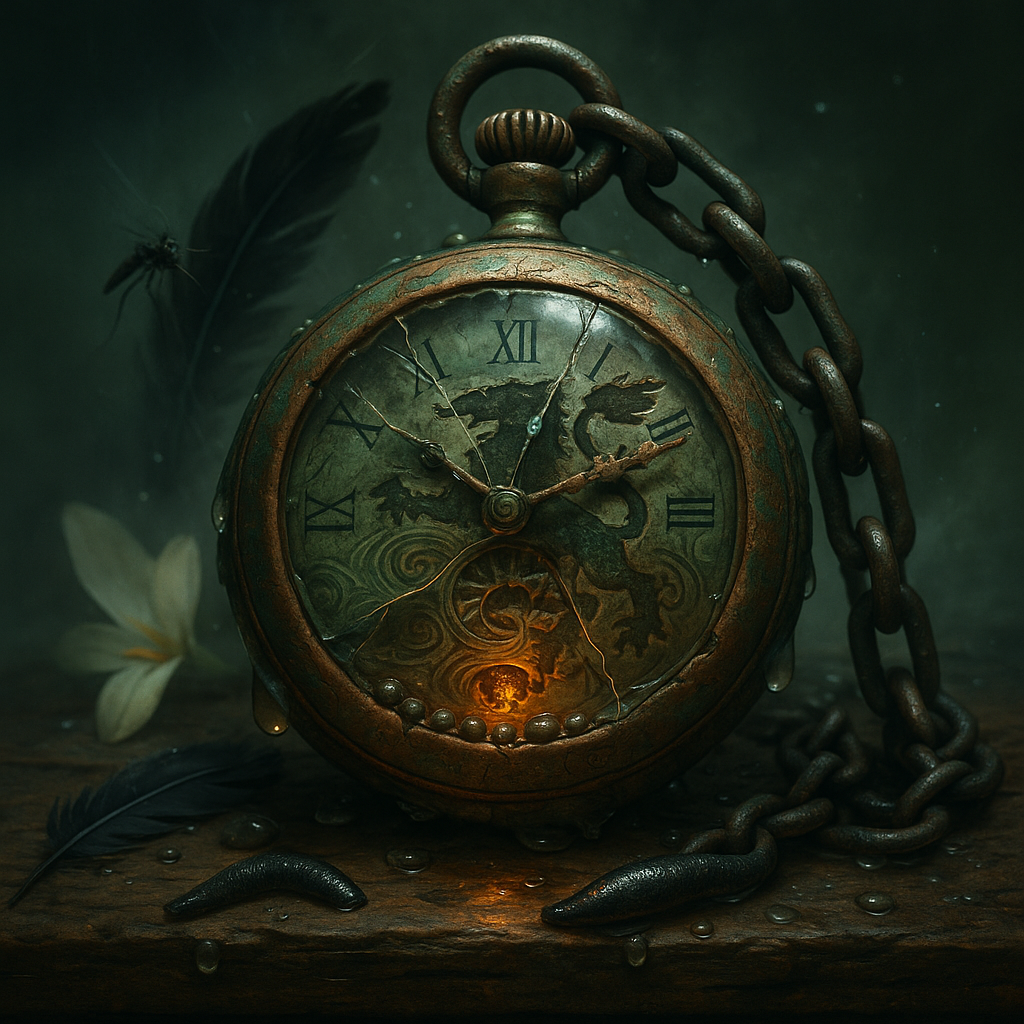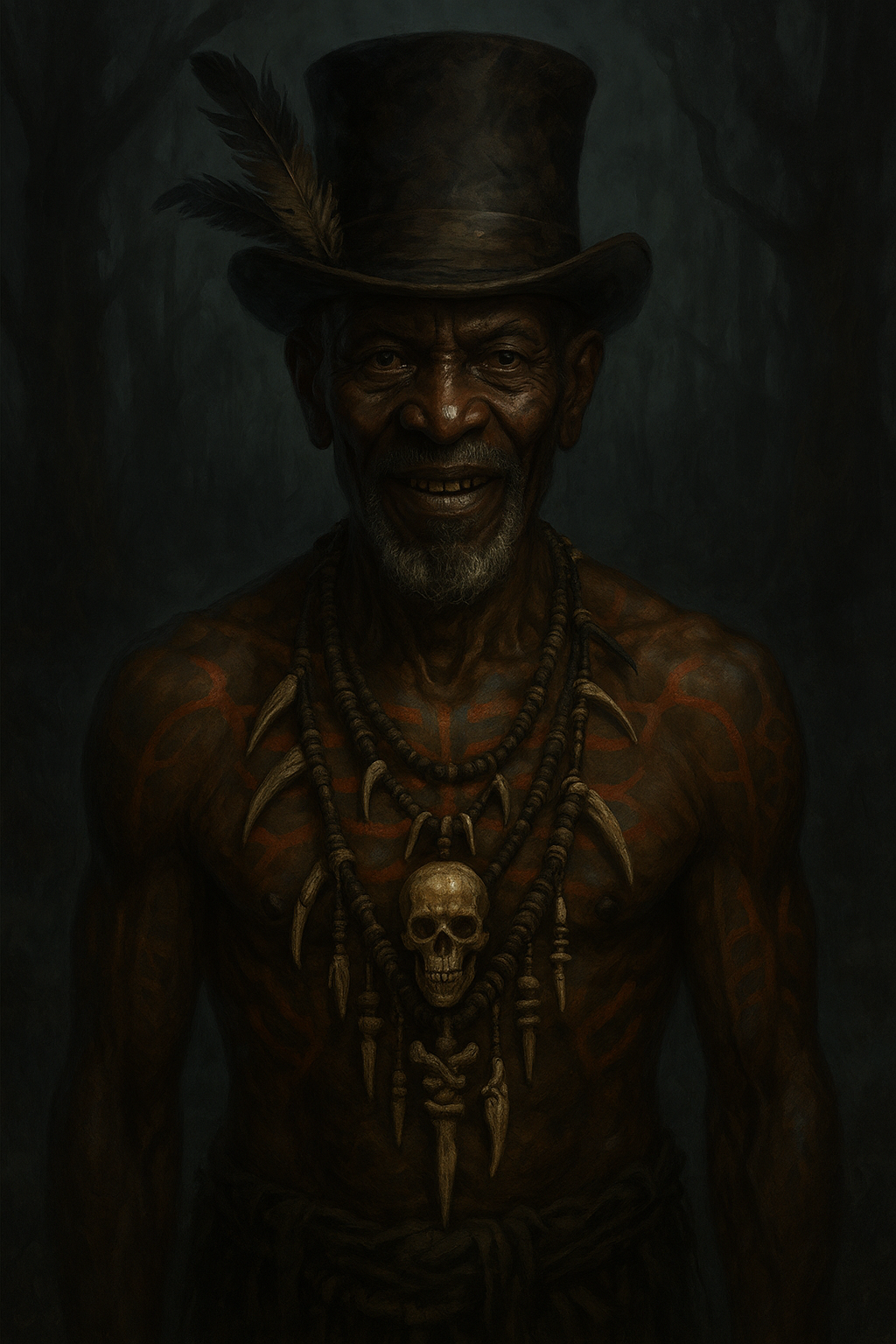
A Lake Lanier Horror: The Sunken Truth
The full accounting of a debt that will not be forgotten.
Prologue
The Spirit Clock
It was 1871. The Caldwells had come to the river that would one day be dammed into Lake Lanier. They saw the river as a thing to be tamed, its current a currency, its bottom a future they could possess. To them, the land was vacant. They chose to ignore the fact that it was the sovereign and ancestral land of the Freedmen, protected by the legal autonomy they had established for themselves. The Caldwells did not have jurisdiction here.
At 3:17, the courthouse bell rang, but it lied. A man died anyway, his neck snapped by a chain that was never meant to be a noose. In that instant the river entered its own legal record—a first entry not written in ink but in silence. The debt was opened.
The river began to keep score. They called it a spirit clock before men dared to name it a watch. Its case was copper, hammered to the thinness of a sinner’s last breath. Its mainspring was a catfish spine coiled with the braided hair of those who had crossed the river without fare. Beneath the face, a ring of blackened nail-parings, harvested from the drowned and set in beeswax that never softened, even in August heat. Each piece was more than ornament; each was record. Copper like judgment. Spine like memory. Nail-parings like signatures on a docket.
Three breaths sealed its power: a Freedman root-doctor who kept the river’s Elder Name hidden in the Tut cipher; a Gullah Geechee American Indian preacher with fire on his tongue; and a midwife who had held both first cries and final sighs in the same calloused hands. They did not write the Elder Name. They spoke it in Tut’s cipher, an Algonquin word whose syllables folded like fishbones in the breath so overseers could not profane it. Only lawful mouths could petition mercy. Wrong mouths might still bind the law—but never sway it.
For guidance and protection, they said Onyeka, water-mother. For binding, they kept the old name unprinted. That Name passed in whispers and half-remembered prayers, each syllable clinging to children’s lullabies like burrs on cloth. When the root-doctor pressed the back shut, the river held its current for the space of a dying man’s blink. He taught them the rule: Water eats what it’s owed. Bind its hunger, and you must count your own. The clock presided. It hung above baptisms where converts wept red clay from their eyes. It swung from ferry ropes, its chain humming when the water grew restless. At harvest rites, its face was anointed with cornmeal and sweat.
It was neither cruel nor kind. When a man cheated a widow of her boundary oak, the hands clicked forward with the sound of a bone snapping. When a stolen hog was returned, the gears sighed like a child easing into sleep. When a fever broke after a family fed the shallows with song, the hands slowed as if dipped in molasses.
Then came the spring of 1871. In a cardhouse brawl fueled by payday whiskey, a stolen pot, and fingers too quick for a Freedman’s winnings, a Caldwell foreman’s boy got himself cut. The knife drew no blood worth mentioning, yet the Caldwells declared the scratch a riot. Their real grievance was deeper: they saw the Freedman community as a stubborn, spiritual obstacle to a plan they had for a lake that would be their legacy. They dragged a Freedman, still smelling of lye and Sunday starch, to the sycamore where the ferry ropes tied off. Someone produced a chain.
“Rope’s too fine for thieves.”
He hesitated just a breath before—
The Unraveling
The root-doctor ran to meet them, the spirit clock cradled like a holy chalice. He was not calling for Onyeka’s mercy, but for the water’s law.
“Debt,” he said in plain English. “Count it right.”
They laughed, a sound like gravel rolling on glass.
“Our count is coming,” the Caldwells sneered. “We’re building a lake. A whole new world.”
But the man holding the chain still hesitated, the cold iron held just shy of the condemned man’s jaw. Seizing the moment, the root-doctor pressed the clock to the dying man’s breast and began to speak the Elder Name. Tut syllables braided with grief. The river waiting to hear.
Before the sacred words could be finished, a Caldwell to his right snarled and swung his rifle butt down. The blow shattered the clock in the root-doctor’s hands, its copper frame crumpling and its glass face breaking at 3:17 as the courthouse bell tolled. The chain that might have spared a life became a noose. Justice interrupted, inverted into its opposite.
When it was over, the root-doctor walked into the river, the ruined clock clutched to his ribs. He had failed to make them count the debt, so it fell to him. The water rose to meet him—not as a flood, but as a host greeting a long-awaited guest—and closed over his head without a ripple.
Three days later, Caldwell men waded into the shallows with gutting knives. They pried the clock from the root-doctor’s ribcage, the copper fused to bone like a brand. With a nail, they gouged the Caldwell lion into the face where the river’s sacred spirals had been then signed the papers that made their theft a deed. They marked it with iron, scarred it with ink. Together, the two weighed heavier than any prayer.
But what they never understood was this: the clock had been forged with breaths freely given, not stolen. The root-doctor’s, the preacher’s, the midwife’s—each offered, not taken. That was the difference between judgment and hunger, between a true Ledger and a hollow vessel.
For nearly ninety years, the clock barely ticked. It did not die. It waited.
The old rule to wake the spirit clock was an elegant, mythic symmetry: three breaths to bind, three to wake. The rite required three elements: a mouth that could speak the Elder Name, a righteous grief honed to a blade’s edge, and harm on consecrated ground. But every tally comes in blood—that is the law beneath the law, the toll for opening the door.
Reverend Joseph Waters brought both the righteous grief and a mouth that spoke the Elder Name, his curse braiding Gullah Geechee American Indian lament with the root-doctor’s Tut-coded syllables. The church fire brought the consecrated harm. But the clock remained dormant. The three elements opened the door, but the price for its full awakening had not yet been paid in blood.
That is why the lion-gouged face never truly worked in Caldwell hands. They could brand it, pocket it, tally their sins by it—but water eats what it’s owed. Without the Elder Name, they were only thieves playing at godhood.
Decades later, when Boy Willie lifted the watch from the Caldwell tent, the Ledger remembered the hands that first closed it. The cracked face fogged with names unseen since Reconstruction. The hands froze at 3:17—the instant justice became a noose—then spun backward like a whirlpool reclaiming its dead. When the long-cracked glass finally shattered and the leeches poured forth, it wasn’t a new curse. It was the river vomiting back the town that had been buried.
The name changed with each keeper: Spirit Clock to the people who made it; Watch to the men who stole it; Ledger to those who learned it tallied breath, not coin. But its purpose never altered. It does not decide what is good. It weighs what was done. And it points—unerring as a compass needle—to who must carry it next.
In time, its laws were misremembered as “lake rules,” cheerful tourist cautions pinned to doors. But they were always the clock’s terms: break one, and the Ledger starts counting you. And once it begins, it never forgets. It only waits.
The Water's Law: A Debt Paid and Unpaid
The Spirit Clock (also known as the Ledger or Judgment Clock) is a powerful, lion-etched clock that does not tell time, but holds it. It serves as a final ledger for the damned, holding the verdict of all who come before the Judge. The clock operates on a single, unforgiving principle: "Water eats what it’s owed. Bind its hunger, and you must count your own."
If the root-doctor had been able to complete the rite in 1871, the clock would have enforced an immediate and specific justice. The man would have been spared, and the river would have claimed a debt from the Caldwells who sought to kill him. This was the clock's intended purpose: to provide a swift, contained retribution that prevented a greater tragedy.
However, the ritual was interrupted. The clock was shattered, and the debt went uncounted. This did not erase the debt; it only allowed it to fester and grow. The water's long-suppressed fury accumulated for nearly ninety years, waiting for the right conditions to finally erupt.
The Final Sacrifice: Swallowing the Spirit Clock
Swallowing the Spirit Clock is the ultimate act of defiance and sacrifice, a spiritual suicide known as "Taking the Verdict." It is believed to absorb the unresolved debt, turning the current verdict to stone and creating a stay of execution.
However, the stay is temporary because the sacrifice is incomplete.
The Law of Balance: A soul can only truly settle a debt that is its own. By swallowing the Clock, an outsider intervenes, but they cannot erase the original sin—only hold its weight. The stay lasts as long as the sacrificer's spirit can endure the torment of the debt they have consumed. It is a ceasefire, not a pardon. The moment the sacrificer's will finally erodes in the depths, or the Clock is recovered, the ledger reopens, and the Judge's call resumes with renewed hunger.
The Three Elements to Wake the Ledger
The old rule demanded three things to wake the clock—a mouth that could speak the Elder Name, a righteous grief, and harm on consecrated ground. But every tally comes in blood; that is the law beneath the law. Oscarville provided all three conditions. Boy Willie’s stolen watch—and the finger it claimed—provided the blood price. It was his sacrifice that sealed the curse and unleashed the full, unyielding fury of the Ledger.
That is why the lion-gouged face never truly worked in Caldwell hands. They could brand it, pocket it, tally their sins by it—but water eats what it’s owed, and without the Elder Name, they were only thieves playing at godhood.
The River Ledger
All balances kept in breaths. Rule: water eats what it’s owed. Bind its hunger, and you must count your own.
- 1871-04-16Sycamore Ferry Cardhouse quarrel called a “riot.” Chain fitted under a Freedman’s jaw. Courthouse bell at 3:17. Debt opened: +1 life (miscounted), +desecration, +theft (Spirit Clock).
- (later)Root-doctor presses the clock to a dying breast, speaks the river’s elder name in Tut. Rifle butt falls. Clock damaged; time fixed at 3:17.
- 1871-04-19The shallows. Root-doctor walks into the water with the ruined clock. Offering accepted; debt remains with takers.
- 1871-04-22Caldwell men recover the clock, gouge a lion over the river spirals. Collateral seized by thieves; interest begins.
- 1956-07-—Oscarville Methodist Fire set on consecrated ground. Children singing. Multiplier invoked; clock stirs.
- (later)State tent by the river. Boy Willie lifts the watch. Glass fogs with names. Collection schedule awakens.
- (later)Riverbank. Reverend Joseph Waters braids Gullah lament with the elder name. Rule satisfied: grief + name + altar. Collection authorized.
- 1957-05-27Lake shore (Memorial Day) Elias Caldwell Jr. taken. Lillian Caldwell recovers the Ledger as it washes ashore. Credit: -1 Caldwell breath. Balance outstanding.
- 2015-— —Cabin 13. Eleanor Caldwell swallows the Ledger to stay the taking. Lillian marked with a bite wound during the exchange. Collection paused; collateral lodged in bone.
- 2023-06-—Lanier’s Hollow. Guestbook ink still wet: Maya Caldwell — DEPARTED (Next Sunday). Danny Caldwell — CHOSEN (Tonight). Court of the Drowned convenes. Balance due. Guest of Honor is a living promise.
- (Family Reunion Day)Aunt Lydia breaks 'No Prayers by the Water'. Collection: -1 Caldwell breath. Cousin Jake breaks 'Don\'t Feed the Fish'. Collection: -1 Caldwell breath. Grandma Vivian's confession and forced ritual. Collection: -1 Caldwell breath. Uncle Travis's countdown expires. Collection: -1 Caldwell breath.
- Guardian’s BreathA living guardian can delay a claim on a minor. The lake will try to separate child from guardian before selection proceeds.
Standing Notes: Prayers by the water accrue minutes. Feeding the fish does the same. Lies add weight. The road out closes at dusk (Court convenes till first light).
Current Balance: Unpaid. Four more breaths collected, but the original debt remains.
Pointer: When the needle points again, it finds a Caldwell.
The Elder Name
The Unwritten Name of the Water. Status: sacred / unprintable.
The Tut Cipher
The Elder Name is protected by a phonetic code known as Tut. This code is a linguistic veil, a sacred substitution cipher that wraps the true name in layers of sound. The name cannot be written or spoken plainly, as doing so would invite unintended or malevolent use. The Tut protects the name from being spoken by an unlawful mouth—a person without a blood, spiritual, or legal claim to the Ledger’s jurisdiction.
The Freedmen community of Oscarville, over generations, learned the rhythms and syllables of the Tut. They held the shape of the code, a prayer passed from mother to son, a way to remember the sound without ever knowing the word itself.
The Algonquin Root
The true Elder Name is a word from the Algonquin language, tied to the original inhabitants of the land. This linguistic truth is the reason Reverend Waters's curse was so potent. He spoke a curse in Gullah Geechee American Indian—a language born of diaspora and resilience—and he performed the ritual according to the cadence passed down through generations. He had the grief, the sacrifice, and the profaned ground, all wrapped in the protective power of the Tut cipher.
Only those bound by the first breaths may lawfully speak the Elder Name—the children of the covenant. Blood carries the obligation, not color. Any other mouth is a wrong mouth, binding the law but never swaying its mercy.
What It Does
- Bind / Convene: Calls the Court and “turns the key” so the Ledger can weigh a case. (Anyone with the phonemes can bind; see risk below.)
- Wake: Stirs the Ledger from dormancy when three conditions are met (see below).
- Petition: Only lawful mouths (descendants bound by the first three breaths—by blood, adoption, or ritual kinship) can ask for stays, substitutions, or reckonings that do not escalate the debt.
Dependencies & Taboos
Dependencies & Instruments
- The Ledger (the watch): The Court’s tally.
- Consecrated Ground: Churches, graves, etc. amplify the Name’s reach.
- Iron & Ink: Chains, deeds, and dams drag on petitions.
Taboos & Risks
- Never write or record the name.
- A "wrong mouth" penalty marks the speaker.
- Careless convening can lock communities in a debt-cycle.
Field Note
Three breaths to bind, three to wake. Name. Grief. Consecrated harm. But every tally comes in blood—that is the law beneath the law. Miss any one of the three, and the water only listens. Meet all three, and it answers—whether you meant it to or not.
ONYEKA (The Comforter of the Shallows, Mother of Crossings)

Classification: Primordial Spirit of Mercy & Witness (Non-Court Entity)
Jurisdiction: Consolation, Safe Passage, Memory. She operates within the ecosystem of the Court but is not bound by its verdicts. She cannot overrule a judgment, but she can offer delays, warnings, and paths of escape.
The Law of Petition: Who May Call
The ability to summon or petition Onyeka is not a universal right. It is a function of spiritual jurisdiction and ancestral resonance, bound by the same principles of debt and record that govern the Court itself.
- Lawful Mouths: Only those bound by the first breaths may lawfully speak to Onyeka—the children of the covenant. Blood carries the obligation, not color. Any other mouth is a wrong mouth, binding the law but never swaying its mercy.
- Basis for Standing:Standing is not a racial distinction but a jurisdictional and spiritual one. It is explicitly lineage-based, tied to the original covenant. Only descendants bound by the first three breaths (by blood, adoption into the covenant, or documented ritual kinship) have standing. Their connection is threefold:
- Geological Resonance: Their spirit carries the frequency of the specific copper-rich soil of Turtle Island that was flooded. Onyeka, as a spirit of that land, answers that specific harmonic.
- Historical Claim: They are the creditors in the Ledger's accounting. Their ancestors were the collateral. This gives them the lawful standing to petition for mercy within the system built upon their loss.
- Ancestral Frequency: Their call is not just words; it is a signal built from generations of specific grief and memory. It is a key that fits a specific lock.
- Wrong Mouths:Those outside these lineages ("wrong mouths") may break the three rules and convene the Court through ignorance or malice, but they cannot petition Onyeka for mercy. They lack the standing. Their voice is static on the line; she cannot—and will not—answer their call. Attempting to force the call can draw the Court's attention instead, resulting in designation.
Methods of Petition
- The Three-Breath Rite: The primary method for a lawful mouth to seek aid. Requires three living voices from the covenant lineages, three breaths over water, and a work-song verse. This rite can grant warning, a temporary path, or a delay. It cannot cancel a name already in the Ledger.
- The Tut Wrap: The Elder Name (the river's true, unprinted name) must never be spoken nakedly. It is always wrapped in layers of Tut code when used in petition, to protect the caller and respect its power.
- Mirror Doctrine: Petitioners must use the principles of stillness and angle to make their call across the water, not down into it. Chop (ripples) will break the connection.
Limitations: Her power is finite. She can provide comfort and create opportunities, but she cannot absolve debt, reverse verdicts, or stop the Court once it is in session.
Associated Signs
- Wade in the Water → Onyeka is near (mercy is possible).
- Swing Low, Sweet Chariot → The Court is convening (her window for aid is closing).
Papa Webb: Keeper of Old Ways

Papa Webb is an old, respected root-doctor, his body bent from a lifetime spent close to the cypress and the swamp. He is a moral authority, a figure who understands the difference between the river's law and a man's law. He is not a wielder of the Court's power, but he possesses deep, ancient knowledge of its rules, its taboos, and the spiritual cost of defying them. He believes that the Ledger is a verdict, an absolute judgment, and not merely a tool to be controlled.
"This thing don’t have power—it is the power of the Court. You can’t copy a judge’s gavel. You can only mock it. And mockery has a price the water always collects."
The Unwilling Creation
Papa Webb was approached by a powerful client who demanded he create a counterfeit of the true Ledger—a "hollow vessel" that could deceive and lure. He agreed only under duress, refusing the gold offered to him and warning that the cost of such a blasphemy would be paid "by the water." He created the Hollow Vessel by corrupting sacred rituals, using stolen breath and a mockery of the Elder Name.
The Double-Edged Weapon
Despite his reluctant assistance, Papa Webb ensured the decoy could not be used against the river's true laws. He warned his client that the decoy was a weapon that "points both ways," a prophecy that serves as a final, desperate act of defiance. He prophesied that if the rightful heirs of the Freedmen were ever to find and touch the Hollow Vessel, their grief could turn it against its creator, "drown[ing] its maker from the inside out."
"If the true heirs... ever touch this hollow thing, they can turn it... That weight will drown you... from the inside out. This weapon points both ways."
Lillian Caldwell – The Keeper of Masks
“Every family keeps its books. Some balance theirs in coin. We Caldwells… we balance in breath.”

Lillian Caldwell is more than a name whispered in the Hollow—she is its echo. Ageless, elegant, and unsettlingly composed, she has watched generations come and go, her face as polished as a portrait until the glass ripples. In public, she is the hostess, the heir, the smiling matron who knows every ledger line by heart. In private, she is the custodian of something far older: a record that does not forgive, a debt that never closes.
Where others see history, Lillian sees accounts. Where others remember, she tallies. Her charm is as practiced as her cruelty is precise. She does not shout or strike; she whispers, she offers, she waits. And always, her words carry the weight of someone who knows the rules were written long before you arrived.
Some call her a benefactor, others a curse. Both are correct.
Omen of the Black Heron
Locals say the black heron isn’t a bird at all—it’s the lake wearing feathers.

Names & Origins
Black Heron, The Bailiff, River’s Messenger. Whispers braid Gullah churchyard warnings: the heron comes when the water is “counting it right”—tallying a debt that must be paid.
How to Recognize It
- Flies without a wingbeat; a moving hole in the light.
- Eyes like oil, unreadable; beak stained as if with old iron.
- Drops feathers that rise instead of fall; when a feather lifts, the shore is already listening.
- Often arrives ahead of sudden stillness—cicadas cut off, air tastes like pennies and lilies.
What It Means
It does not hunt; it summons. The heron marks moments when the lake’s rules are about to be enforced. Looking left: the lake is tallying. Looking right: a name is being chosen. If it perches and stays, time has run short; if it circles without landing, there may yet be an exchange.
Do
- Get indoors.
- Cover mirrors.
- Keep water containers capped.
- If a feather lands at your feet, step backward without turning around.
Do Not
- Speak your full name near the shore.
- Feed the fish.
- Pray by the water.
Field Notes & Sightings
- 1871: Recorded in river-keeper journals during a “miscounted” hanging; silence fell before the bell.
- 1956: Seen on Oscarville’s steeple as the church burned; parishioners reported the air “went hollow.”
- 1957: Memorial gathering on the new lake; attendees spoke of a heron that landed without ripples and a shoreline that “coughed something up.”
- 2015 / 2023: Quiet, inland appearances on windless nights; always near Cabin 13.
Interpreting a Visit
Think of the heron as a process server for the deep. It doesn’t decide what is good; it confirms what was done and points to who must carry it next. When you see it, the lake is already counting.
“It landed without stirring the water. The shadow moved, but the air didn’t. We all shut up at once—like something else had walked into the room.”
Mirror Lore
What a Mirror Is
In this world, water is the oldest mirror—and every other mirror is a younger copy. Mirrors don’t just reflect; they bear witness. A still surface doesn't show what is, but what is true under the law of the deep.
The Three Laws (as taught in the Drowned Schoolhouse)
- STILLNESS FIRST: The surface must be calm. Ripples, glare, or noise create "chop," which lies.
- ANGLE SECOND: Truth is seen from the side. Look across the water, not down into it. A direct look invites distortion; a grazing glance reveals it.
- CHOP PUT BY: Clear the interference. A windbreak, a shaded glare, a hushed room.
WATER IS MIRROR. STILLNESS FIRST. ANGLE SECOND. CHOP PUT BY.
What Mirrors Do
- Create a Chamber: Three lawful breaths create a Chamber—a temporary space of jurisdiction that can verify truth without summoning the full weight of the Judge.
- Remove Permission: Predators that rely on glamour (e.g., Lillian’s “mask”) lose control when held in a correct mirror angle. The mirror decides, not the wearer.
- File Evidence: A true image caught under the rules is entered into the record. The Court “notes the account” even without a full verdict.
Who Mirrors Hurt (and Help)
- Liars & Retainers: Reflections strip away masks and administrative tricks. They can’t be curated once the laws are met.
- Children: Minors are stayed. Mirrors can protect them by preventing false entries.
- The Resistant: The living (like Maya) can use Chambers to pin a truthful image and break a glamour's hold.
Field Rules (A Survivor's Guide)
To build a pocket chamber:
- Find Stillness: A jar of water, a darkened glass.
- Set the Angle: Use a small mirror to cast a grazing light across the surface.
- Take the Three Breaths: The Keeper holds the frame. The Witness nods assent. The Kin hums the old note.
WARNING: A broken Chamber can draw attention. If the chop returns, the connection snaps—and the subject will know they were being watched. Count to 3:17: Many entries align with this time; be ready for a snap-to-truth at that moment.
Lillian & Mirrors
Lillian's power is glamour—a request for "permission." A true Chamber revokes that permission, fixing her true, waterlogged face on the surface and breaking her control. This is why she has purged the resort of mirrors.
The Decoy vs. Mirrors
The Hollow Vessel (Decoy) does not weigh or judge. It only hums, agitating the will. In a proper Chamber, a Decoy is revealed as false weight, and the mirror will note it as a "hollow vessel."
Tut (Tutnese) in Lanier’s Hollow
The mask that keeps power from predators. Memory you can’t erase, prayer you can’t prosecute.
What It Is
Tut, also called Tutnese, is a real 19th-century code once used by indigenous copper colored inhabitants of turtle Island to speak in plain sight. In our world, Tut survives in whispers, children’s games, and church kitchens. In the novel’s lore, Tut becomes a protective veil: a way the Freedmen of Oscarville encoded sacred language—especially anything near the river’s Elder Name—so oppressors could not weaponize it.
“Do not write the river’s name. Wrap it in Tut. Three breaths to bind; three to wake.”
Only descendants bound by the first three breaths (by blood, adoption, or ritual kinship) can truly invoke with Tut. Others can repeat the code, but without the standing, it’s noise the lake ignores.
Hides the Elder Name
Saying or writing the river’s true name directly is taboo; Tut “wraps” it so it is recorded without being exposed.
Signals the Ledger
Certain Tut lines, when paired with the three breaths rite, can bind or wake the Ledger at thresholds.
Keeps History Alive
Marginal notes, hymn scraps, and children’s chants in Tut preserve what the town tried to erase.
Diegetic Examples
Margin note (register):
Wack-rug-a-tut-e th-e rug-nam-e. Nuno-tut pup-e-pen. Wra-pup in Tut. Thre-e bre-e-sus to bin-dud; thre-e to wak-tut.
“Do not write the river’s name. Do not put it to paper. Wrap it in Tut. Three breaths to bind; three to wake.”
Pamphlet pencil scrawl:
Lulakakayi hush. Wack-a-tut-e vuv-ow. Rug-o-ad sus-hut at du-dusk.
“Lake hush. Water vows. Road shuts at dusk.”
Jump-rope / hum cadence:
Leader: Lulakakayi, lulakakayi— hush-sus hush-sus, tut… tut… tut…
Children: Wack-a-tut-e rugs us, nuno-tut nam-e, nuno-tut writ-e.
“Lake, lake— hush hush, tick…tick…tick… / Water holds us, don’t name it, don’t write it.”
Boundaries & Mechanics
Tut & Onyeka
Onyeka is the comforting aspect—the mother-of-waters who receives prayers and songs. Tut is the wrapper that keeps those prayers safe from hostile eyes. The Elder Name (unprinted) is the binding key—spoken only by the rightful mouths, and never written except wrapped in Tut. Onyeka can soothe; the Elder Name can turn the key. Tut keeps that key from being stolen.